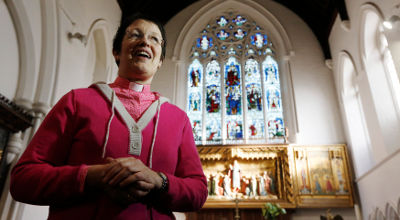The Church of England’s governing body on Tuesday narrowly blocked a move to permit women to serve as bishops, leaving the church facing more years of contentious debate.
Following a daylong debate, opponents mustered enough support to deny the necessary two-thirds majority among lay members of the General Synod, with backers falling six votes short of passage.
Many speakers expressed regret that they were unable to agree on a way forward.
“Whatever the outcome, there is no victory in the coming days,” said Rev. Angus MacLeay, summing up for the opposition. “It is a train crash.”
The defeat was a setback for Archbishop of Canterbury, Rowan Williams, who retires at the end of December, and his successor, Bishop Justin Welby. Both had strongly endorsed a proposed compromise that they had hoped would end decades of debate on the issue in the church which has around 80 million members worldwide.
Rev. Rachel Weir, leader of Women and the Church, said the group was “absolutely devastated.”
“Not just devastated on behalf of clergy women — obviously this will be an enormous blow to clergy women, it’s awful for their morale — but it’s a disaster for the Church of England.”
Passage of legislation to allow women to serve as bishops must be approved by two-thirds majorities in the synod’s three houses: bishops, priests and laity.
The vote was 132 in favor and 74 against. In separate votes, bishops voted 44-3 in favor with 2 abstentions, and clergy voted 148-45 in favor.
Synod members were voting on the latest compromise which calls for church leaders to “respect” the position of parishes that oppose female bishops — without saying what “respect” would mean in practice.
Church officials say it may take five years to go through the process of taking new legislation to a final vote.
There was much talk from opponents about fresh negotiations, but few ideas about how to resolve the split.
“The trouble is our disagreement is absolute: either a woman can be a bishop, or she cannot,” said Rev. Janet Appleby, a parish priest who drafted the compromise.
But she added that “respect … ensures that parishes that are unable in conscience to accept women priests and bishops will be able to receive appropriate ministerial and episcopal oversight.”
“We all think something different is right,” said Rev. James Dudley-Smith. “We are divided and yet today we are forcing ourselves to vote.”
Canon Simon Killwick from Manchester, opposing the compromise, argued that it was “possible to be in favor of women bishops in principle, but to believe that this was the wrong legislation for introducing women bishops.”
It has been 36 years since the General Synod declared it had no fundamental objection to ordaining women as priests, and 18 years since the first women were ordained. But that change never won universal acceptance in the church, with a determined minority arguing that that the move was contrary to the Bible.
That group, affirming what it sees as the Biblical idea of male “headship,” has demanded special arrangements to shield it from supervision by female bishops.
Bishop James Jones of Liverpool said he had once embraced male headship, but had changed his mind.
“The truth is that without women in leadership we are no longer able to serve the people in the parishes of England,” Jones said. “Women serve as leaders in scripture, on the mission field and as supreme governor and in this General Synod.”
He and several others noted that a woman, Queen Elizabeth II, is the church’s supreme governor.
Bishops called an emergency meeting for Wednesday morning to assess the result, church officials said.
“This leaves us with a problem,” said Bishop Graham James of Norwich. “Forty-two out of 44 dioceses approved the legislation and more than three-quarters of members of diocesan synods voted in favor.
“There will be many who wonder why the General Synod expressed its mind so differently,” James said.
Sister churches of the Anglican Communion in Australia, New Zealand and the United States already have women serving as bishops.
Southern Africa joined that group on Sunday with the consecration of Ellinah Wamukoya as the Anglican bishop of Swaziland.
Copyright 2012 The Associated Press.
See an error in this article?
To contact us or to submit an article





















